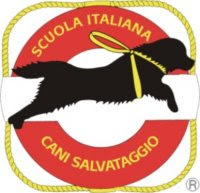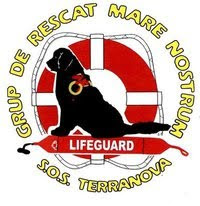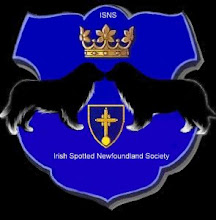
(By Fullerton L. Waldo - 1919)
"This is a true tale of the simple heroism of a dog who saved the lives of ninety-two people when the mail-boat Ethie went to smash on the reefs off Martin Point, Newfoundland, December 10,1919. A week later, the newspapers of this country had the bare fact of the deed, sent out by my friend A.L. Barrett, Associated Press correspondent and editor of 'The Western Star' at Curling, on the west coast. 'The Western Star' is the only newspaper on the entire coast, and it has a circulation of 750, weather permitting.
I came home from Labrador by the Ethie in September. She crawled up and down between Curling on the Humber, and Battle Harbor, on the Labrador, where Dr. Grenfell's hospital is planted, nosing her way into every bight and cove and tickle and harbor and bay where there was any chance of dropping a barrel of oil or picking up a kental (112 pounds) of salt cod. Going north was bad enough, but coming back was worse. The boat was so heavily laden that the deck outside the musty cabins was about thirty inches from the sea when it was calm. I had one thirty-sixth of the tiny dining-saloon; and for two nights out of four, spent buffeting a long-shore, sleep was quite unthinkable. War travel in Europe was the acme of comfort compared with it. For at every place we stopped, though at midnight in a darkness thick as gravy, the whole of a tiny hamlet swarmed aboard and held its owl-home week and Parliament in one. The babies were invariably brought, and the teething ones seemed chosen to stay with us, and 'spell each other in relays of lamentation, hardly to be told sometimes from the crying of the wind. There was no wireless; and when I met the boat, she crawled out of a fog where she was hidden for four days, and where an iceberg, towering so high that the top disappeared in a mist, had all but done for her. In trying to make the channel to the dock at Flower's Cove, she struck the rock on four different voyages last summer. But not through the fault of the captain, and not because he was reading Dickens in his bunk. I never saw officers and crew more faithful. They never seemed to sleep, and the pursuer was to be found at all hours of the night down in the hold, while the steam winch clacked and clattered, checking off the badly labeled, ill-assorted cargo as it was hauled aloft and lowered aboard the flocking power-boats. An anxious business was it for the consignee if a package went astray. Dr. Grenfell waited two years for a searchlight to come from his friend Dr. Daly, the geologist of Harvard; and remedies vitally wanted for patients might fail to arrive.
The lower deck was crammed with oil and fish and machinery and hay and flour - the hay worth eighty dollars a ton at least, and the flour twenty-four dollars a barrel. Cattle came and went, protesting - small horses with wild eyes and pitiable cows and calves: but none got to the farthest north, for the dogs would eat them there, and Uncle Phil Coates is the wonder of all Avalon Peninsula because he keeps four pigs.
Is the preamble too long? One must get the picture of the sloppy boat, swollen with its cargo and passengers, to know what the dog did of whom were are presently to hear.
The Ethie on December 10 was laboring back to Curling for perhaps the last trip of the season. She was off Martin Point, between Cow Head and Bonne Bay, when 'a mighty wind arising,' with icicles for its teeth, drove her on to the rocks. This is the district of Sainte Barbe, the patroness of thunder-storms, and though thunder-storms themselves are rare, the gales and the ice and the rage of the sea are harder on a little ship. The Ethie, forth years from her cradle on the Clyde, a tub of iron sheathing, never meant for this ding-dong service in the ice-fields of the Gulf of St. Lawrence, rebelled against her two wheelmen clinging for dear life to the spokes in the raving storm, and plunged slam-bang on the reef, where the black dragon-spines of rock run out from the Point. Logy of herself, and superladen with all that the fishermen could stow aboard, there was no hope for her life from the moment that she struck upon the rocks, and a mighty shudder thrilled her frame and filled her passengers with fear.
For they remembered the Florizel, and how the sea washed off the people one by one from the upper works of the wrecked vessel; they remembered the fate of the 150 sealers lost with the Southern Cross; they remembered a hundred wrecks, the winter's tale of all the coast.
And this is where the dog comes in.
It was not possible to launch the boats. I know those boats well, for they were about the only sitting-room that I could find in my September journey. They were like museum specimens - archaic as the Indian relics at St. John's, their ropes and covers fairly falling to pieces, their biscuit mediaeval, and their water foul. One of the boats was workable - I went ashore for mail at Cow Head, ten miles from the Point where the wreck took place.
None of the crew dared to attempt the swim through the freezing waters. The sailor who can swim is almost as rare in Newfoundland as the great auk or the Newfoundland wolf, which are extinct. So the effort was made to shoot a line ashore, but the line fell far short and caught in a snarl upon a tooth of a rock.
Then they put over the dog. I do not know his name, but I have sent to Newfoundland to get it, for some Philadelphia people want to give him a collar, engraved. Evidently this animal was on the way from the Labrador to draw the winder mail-sledge over the trail from Bonne Bay to the railway at Deer Lake.
So they threw this noble beast into the sea; then they shouted to him words of command; and with a sagacity that would be preternatural in any other sort of dog, he swam to the rock where the rope was caught, and wrestled with the tangle till he worked it loose; and then with the free end gripped in his teeth, he struggled for the shore.
If you have ever been in that black, frigid water (as I have), you will understand the monumental feat of that grand little swimmer! From the ship and from the shore they could see him; and they cheered him as he rose on the crest of a white, tearing wave, and sank again in the scooping hollow of it, holding to the rope, though the weight of it all but pulled him down and drowned him as the freezing salt water sluiced into his jaws. Can you not imagine that little, straining, eager head, and in his eyes the light of half-despair and half a hope, that no man saw, though God in Heaven must have known and taken pity. Have you thrilled to the run of Masefield's 'Reynard the Fox'? This dog's short swim of several hundred feet was a finer thing - for the lives of ninety-two were hanging by that rope and by the thin-spun thread of a dog's life.
It had been a life of hardship and abuse - of all-too-common kicks and blows, and hiding under the bottom-boards of houses, living on scraps and cabbage-leaves and the cod-heads, til the snow came whirling and the sledges must be drawn. But on this reeking boat there were hands and voices that had been kind to him; and now he was saving them all, and he must have known it.
When - exhausted, trembling, all but frozen - he staggered, rope in mouth, out of the last billow to the pointed cobbles of the beach, there were willing hands of men to take the rope from him, and they rigged up a tackle with a boat-swain's chair betwixt the ship and the shore, and so ninety-one adults were drawn from the doomed vessel to the safety of the land. The ninety-second was a baby, eighteen months old, and the baby traveled in a mail bag, 'pleasantly sleeping and unaware.'
And the dog? Let us hope he does not have to cut the pads of his feet on the icy mail-route over the trail from Bonne Bay to Deer Lake this winter! Let us hope that after the life of fighting with the other dogs for the crumbs that fell from the master's table, he now sleeps well beside a roaring fire of hackmatack logs, among those who love and fondle him, well-fed and snoring, dreaming - his nose twitching as he dreams - of his great adventure!"





































No comments:
Post a Comment